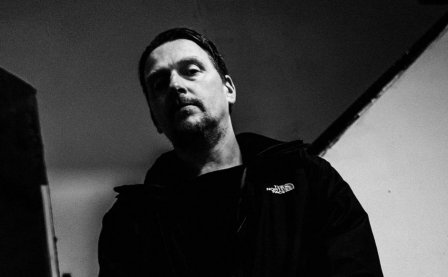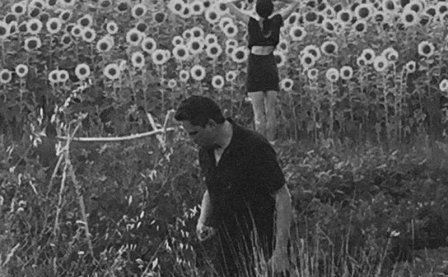A reviewer of any of Justin K. Broadrick’s many projects faces the great temptation to slip into a recitation of the Broadrick List. But Broadrick is indeed a visionary who has brought an unmistakable sensibility to countless genres of post-punk music, many of which he himself had a hand in inventing, including grindcore, which he inaugurated while still a teenage guitarist for Napalm Death, and industrial-metal minimalism with the long-running Godflesh. He’s also made stops along the way in no wave (Head of David) and dark ambient (Final), and even jazzcore, breakbeat-damaged IDM, and cyberpunk hip-hop (God, Techno Animal, and Ice, respectively; all with collaborator Kevin Martin). Broadrick’s participation in a project means it is guaranteed to be singularly intense and severe.
I first encountered Broadrick’s vision via Godflesh, his duo with bassist G.C. Green. Godflesh is one of the earliest metal bands I can think of that conforms to Simon Reynolds’ definition of post-rock: “bands that use guitars but in nonrock ways, as timbre and texture rather than riff and powerchord.” Godflesh took metal sonics and abstracted them, dehumanized them — draining them of theater and narrative, leaving inhuman power and unfeeling aggression. Even their 1996 cover of AC/DC’s “For Those About to Rock” completely erases the human, bluesy, sexy element of rock. It makes rock into a threatening act done by a machine on a human victim. (Perhaps as supplication, “Machines” were usually given independent credit in the liner notes of Godflesh albums.) Broadrick actually changes the lyric from “we salute you,” to “we pollute you.” I was a polluted, depressed teen myself in the mid-90s, and Godflesh was one of the first bands I came across that spoke to the emptiness I felt. As a kid trying and failing to compose an identity myself, I hated any music that seemed whole and without seams. Godflesh was stripped all the way down, and its incompleteness seemed a refusal to hide the existential, anti-human void that I, too, felt.
I indulge these personal details only to set the scene for my response in 2004 to the release of Heart Ache, Jesu’s debut EP, out of print for years and now being reissued by Hydra Head along with the previously un-released Dethroned EP. The Jesu project, which shares a name with the final track on the final Godflesh album, (Godflesh disbanded in 2002 after Green’s departure from the band and a cancelled tour of the US), introduced a new emotional palette to Broadrick’s universe, which could not help but enter into my own. Whereas Broadrick had turned rock into a misfiring automatic weapon with Napalm Death and into a punishing computer with Godflesh, the final lines sung on Jesu’s debut EP have him chanting what sounds like “Rise rock!” And it’s cheesy, but this EP is rising rock. The sound of Godflesh is still present, but the instruments are rising out of it, though the depths are still all around. As with all good pop songs, metalgaze or otherwise, the songs express highs and lows simultaneously, in the very same notes. With Jesu’s harmonically rich shoegaze-metal pop songs, Broadrick found a way to inject optimism and melody into heavy epics without turning them into power ballads. Making metallic guitar music beautiful has been done before, at least as early as the transcendent guitar symphonies of Rhys Chatham, but the articulation of any optimism or wholeness out of the body of work of one of the most rigorous rock nihilists of the alternative era was mind-blowing to my college brain.
The Heart Ache EP consists of two 20-minute songs. The first six minutes of “Heart Ache” is a familiar Godflesh grind. Six minutes in, however, a Mellotron-triggered sampled choir starts up, and a clear guitar line begins to ring out, introducing a new guitar tone that will characterize Jesu throughout the albums and EPs to come, followed by Broadrick’s clear, yearning vocal and a slowly evolving composition including chiming acoustic guitars and keyboards, all played by Broadrick. The song succeeds in taking the listener on a complex journey without the pummeling loud-quiet-loud dynamics of the archetypal post-rock song. “Ruined” is even more cohesive, with a gorgeously downcast, ringing motif. The previously unreleased Dethroned EP is less impressive: unfinished songs still very much in a Godflesh mode. The title song is muscular, but marred by anonymous processed vocals, and “Aurated Skin” is beautiful but airless, falling a bit too close to formulaic dreampop.
Jesu’s compositions would become both shorter and more melodically condensed in the self-titled LP that was released later that year, and Broadrick would revisit the extended composition format more ambitiously on last year’s Infinity, but Heart Ache is still very satisfying music. This is not the best or most refined Jesu album and for the casual listener perhaps not the best place to start. For the Jesu fans who have not been able to track the debut EP down, however, it is well worth a listen. There are both so many and so few Jesu songs. Arguably, there is just one emotion being expressed on Jesu albums, but it is a complex emotion that doesn’t really have a name — one that I feel like returning to often. The pop melodies played deathly slow, rising along a rumbling wall of guitar and percussion, seem to express a guarded optimism, earned through pain and loss — the only faith I know.
More about: Jesu




